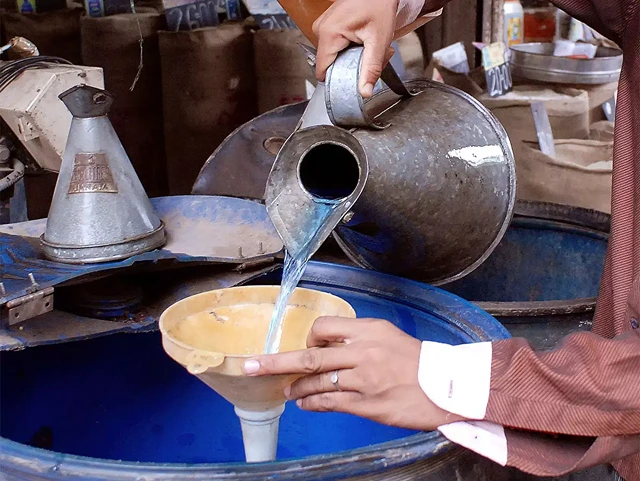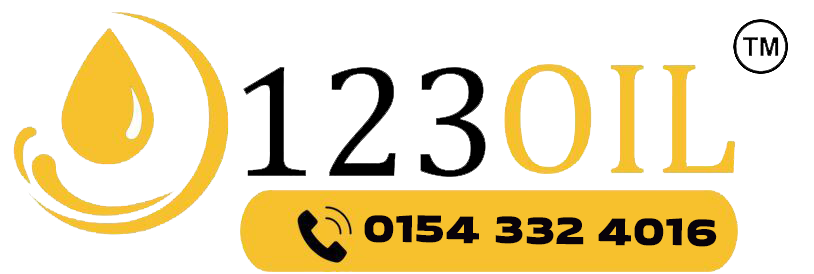Premium kerosene is standard kerosene enhanced with additives that improve performance. Standard kerosene is a clean-burning petroleum fuel suitable for most oil boilers and heaters. In contrast, premium kerosene contains detergents, corrosion inhibitors, and anti-wax/anti-freeze agents that provide cleaner combustion, reduced soot and odour, improved cold-weather flow, and longer storage stability.
Kerosene is one of the most widely used fuels in the UK, renowned for its versatility, reliability, and efficiency in heating systems, particularly in rural areas without access to mains gas. However, many homeowners and businesses often face a question when ordering heating oil: should they choose standard kerosene or premium kerosene?
While both fuels share the same origins, there are key differences in their formulation, performance, and suitability for various applications. Understanding these distinctions can help you make a more informed choice, saving money and improving your heating system’s lifespan.
This comprehensive guide explores the difference between kerosene and premium kerosene, including their composition, benefits, uses, and cost implications, to help you decide which is best for your home or business.
What Is Kerosene?
Kerosene, also known as paraffin or 28-second oil, is a light petroleum product refined from crude oil. It’s a clear to pale yellow liquid that burns cleanly and efficiently, making it one of the most popular fuels for domestic heating systems, portable stoves, and industrial applications.
Kerosene has been used for over a century and remains the primary heating oil for homes equipped with oil-fired boilers. Its low viscosity, stability, and ability to ignite easily make it ideal for both indoor and outdoor heating systems.
Standard kerosene is typically classified as Class C2 fuel under British Standards (BS 2869). It meets the necessary combustion and safety requirements for modern boilers and heaters, but may not always provide the enhanced performance of its premium counterpart.
What Is Premium Kerosene?
Premium kerosene, often branded under various trade names, is standard kerosene enhanced with additives to improve its performance, efficiency, and cleanliness. These additives help the fuel burn more cleanly, reduce soot formation, and protect heating systems from corrosion and deposit build-up.
It is sometimes referred to as treated kerosene, super clean kerosene, or premium heating oil. It’s designed to deliver better long-term protection for modern condensing boilers and to minimise maintenance issues associated with standard fuel.
In simple terms, premium kerosene is a more refined and technologically improved version of regular kerosene. While both can effectively heat your home, premium kerosene offers smoother, cleaner, and more efficient combustion.
Key Differences between Kerosene and Premium Kerosene
Although both fuels are derived from the same source and used in similar applications, there are several important differences in their composition and performance.
Chemical Composition and Additives
- Standard Kerosene: Contains pure hydrocarbon compounds refined from crude oil. It has no additional additives apart from stabilisers required during storage and transport.
- Premium Kerosene: Contains special additives that enhance performance. These additives may include:
- Detergents to clean fuel systems and prevent blockages.
- Corrosion inhibitors to protect internal metal components.
- Stabilisers to extend fuel shelf life.
- Anti-freeze agents to improve performance in low temperatures.
These additives significantly improve the combustion quality and reduce soot build-up, keeping heating systems in better condition for longer.
Combustion Quality
Premium kerosene burns more efficiently and produces a cleaner flame, which means less carbon and soot residue inside the boiler or heater. This results in lower maintenance costs and improved energy efficiency.
Standard kerosene burns effectively, too, but it can leave small carbon deposits over time, especially in older systems, leading to more frequent servicing.
Odour and Emissions
Kerosene, by nature, has a distinct smell that some people find unpleasant, particularly when filling tanks or during start-up and shutdown cycles.
Premium kerosene is formulated to reduce odour emissions both during combustion and storage. It emits fewer pollutants such as sulphur oxides and particulates, making it a cleaner and more environmentally friendly option.
Storage Stability
Fuel degradation can be a problem if heating oil is stored for long periods without use. Standard kerosene can gradually break down, forming sludge and deposits that can clog filters and fuel lines.
Premium kerosene, on the other hand, contains stabilisers and antioxidants that prevent degradation, extending its shelf life. This makes it ideal for homes or facilities that use heating oil on a seasonal or infrequent basis.
System Maintenance and Longevity
Boilers and heaters running on standard kerosene require more frequent cleaning and maintenance, especially during periods of heavy winter use. Carbon build-up and deposits can affect efficiency over time.
Premium kerosene helps reduce these maintenance issues. Its cleaner combustion ensures less residue, fewer filter blockages, and improved boiler efficiency. Over the long term, this can significantly extend the lifespan of your heating system.

Performance in Cold Weather
Cold weather can cause wax crystals to form in kerosene, thickening the fuel and restricting its flow through pipelines and filters.
Premium kerosene contains anti-freeze or de-waxing additives that improve its performance in sub-zero conditions. This ensures that your heating system runs smoothly, even during the harshest British winters.
Environmental Impact
Premium kerosene burns more cleanly, releasing fewer greenhouse gases and particulates than standard kerosene. Its cleaner combustion also reduces the risk of soot entering the atmosphere, contributing to better air quality.
This makes premium kerosene a more sustainable option for homeowners who want to reduce their environmental footprint without switching to alternative energy sources.
Cost Difference
Unsurprisingly, premium kerosene costs more than standard kerosene. The price difference typically reflects the cost of additives and the enhanced refining process.
However, many users find that the higher upfront cost is offset by lower maintenance expenses, fewer service calls, and improved fuel efficiency over time.
Suitability for Modern Heating Systems
Modern condensing boilers are more sensitive to the quality of the fuel than older models. Premium kerosene’s additives help ensure consistent, efficient combustion in these high-performance systems.
If you have an older boiler, standard kerosene may still be perfectly adequate. But if your system is newer or you want to maximise its efficiency, premium kerosene is the smarter choice.
Comparison Table: Kerosene vs. Premium Kerosene
Feature | Standard Kerosene | Premium Kerosene |
Additives | None or minimal | Advanced additive package |
Odour | Stronger | Reduced odour |
Storage life | Moderate | Extended |
Combustion | Efficient but produces residue | Cleaner and more efficient |
Cold weather performance | Average | Excellent due to anti-freeze agents |
Maintenance | More frequent | Reduced |
Environmental impact | Moderate emissions | Lower emissions |
Cost | Cheaper | Slightly more expensive |
Best for | Older heating systems | Modern, high-efficiency boilers |
Which Should You Choose: Kerosene or Premium Kerosene?
The choice depends largely on your heating system, budget, and priorities.
Choose Standard Kerosene if:
- You have an older boiler or a simple heating system.
- You’re looking for the most cost-effective heating option.
- You use heating oil regularly and refill frequently.
Choose Premium Kerosene if:
- You have a modern condensing or high-efficiency boiler.
- You want cleaner-burning fuel and lower maintenance costs.
- You live in a colder region and need reliable winter performance.
- You want to reduce odour, emissions, and system wear.
In short, while both fuels will effectively heat your home, premium kerosene offers superior performance, cleaner combustion, and longer-lasting protection for your heating equipment.
Tips for Storing and Using Kerosene Safely
- Store in a Clean, Secure Tank: Ensure your oil tank is free from water or debris to prevent contamination.
- Check for Leaks Regularly: Inspect pipes, fittings, and tank seals for any signs of wear or damage.
- Order from Reputable Suppliers: Always buy kerosene or premium kerosene from trusted suppliers like 123 Oil, known for delivering high-quality, compliant heating fuels.
- Schedule Regular Servicing: Have your boiler and fuel system inspected and serviced annually to maintain safety and efficiency.
- Avoid Mixing Fuels: If switching from standard to premium kerosene, allow the tank to run low before topping up with the new fuel to avoid dilution of additives.
Environmental and Economic Perspective
While premium kerosene may cost slightly more, its cleaner-burning properties help reduce emissions, making it a more environmentally conscious choice for consumers. Over time, it can also lead to lower operational costs due to reduced maintenance and longer equipment life.
With the UK moving towards greener energy practices, fuels like premium kerosene provide a balanced approach, maintaining efficiency while reducing environmental impact.
Final Thoughts
The difference between kerosene and premium kerosene lies not only in their chemical composition but also in their performance, longevity, and overall value. Both fuels are reliable, but premium kerosene stands out for its advanced formulation, cleaner burn, and protective benefits for heating systems.
If you value long-term efficiency, lower maintenance costs, and better performance in cold weather, premium kerosene is undoubtedly worth the investment. However, for those seeking a cost-effective and dependable option, standard kerosene remains a trusted choice for homes in the UK.
Understanding these differences ensures that you choose the right fuel for your needs, maximising both comfort and efficiency throughout the heating season.
Frequently Asked Questions
Premium kerosene contains additives that improve combustion efficiency, reduce soot, and protect boilers from corrosion, while standard kerosene does not.
Yes, premium kerosene is compatible with all oil-fired boilers. It works especially well in modern condensing boilers, helping them run more efficiently and cleanly.
Although it costs slightly more, premium kerosene can extend your boiler’s lifespan, reduce maintenance costs, and improve fuel efficiency, making it a worthwhile investment.
Yes, premium kerosene is formulated with odour-suppressing additives, making it a cleaner and less noticeable fuel, especially indoors.
If your system is new, prone to maintenance issues, or located in a cold climate, upgrading to premium kerosene can help ensure smoother and more reliable performance.










